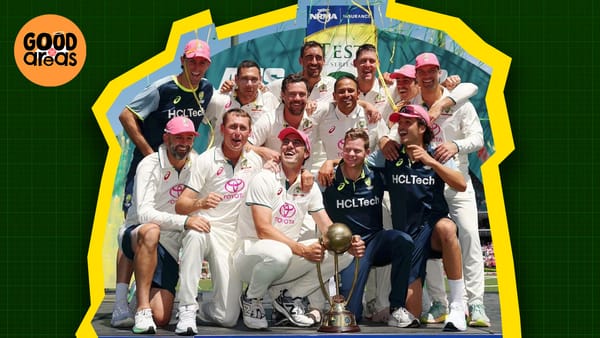T20 and the kidnap of modern players from their nations
How players throughout the years have turned their back on the national team
The atmosphere at Lord's crackled with anticipation as the sun bathed the field in a warm golden glow. The year was 1878, and a clash between the Australians and Middlesex was set to ignite the passions of cricket fans. But as the game started, something, or someone, lurked in the shadows.
That is because, across the sprawling city of London, another game of monumental proportions was underway. Surrey, the formidable hosts, faced off against Gloucestershire, a team boasting the legendary WG Grace as their star. At that point, he was a bigger draw than Australia, and larger than the game itself.
Despite the fact Australia were playing Middlesex, and Grace was up against Surrey, the real clash would be the biggest hero in cricket, and the team that changed it all.
The reason was both camps had laid claim to Billy Midwinter, a highly talented player who had been born in Gloucestershire and had already played Tests for the Aussies. He was torn between the two. But on this day he with Australia at Lord’s ready to play.
This is something that WG Grace only found out when he realised he was one man short at the Oval. He could have found a substitute for this team. But did something far more full-on.
Determined to salvage the situation, Grace, accompanied by his brother, EM, and the imposing Arthur Bush, a wicketkeeper and rugby bruiser, embarked on a frantic journey to Lord's in a carriage, leaving behind a makeshift group of substitute fielders in their place.
Upon arrival at the home of cricket, the man bigger than the game, stormed into the visiting changing rooms, his eyes fixed on Billy Midwinter. What happened next is known as the kidnapping of Billy Midwinter. Though the term 'kidnapping' may exaggerate the situation. Midwinter, torn between his commitment to Gloucestershire and the allure of representing his country, found himself caught. But duty prevailed, and Grace persisted, so Midwinter travelled with him to the Oval.
But while this was happening, Australian captain Dave Gregory, who had already tried to stop Grace at Lord’s, got his own large men posse and found his own carriage so they could follow that cab as both groups read across London to the Oval.
When they all arrived, it was more like a Western Shootout than an all-in brawl. There was lots of name-calling, yelling in each other’s faces and unparliamentary language use. Though somehow, no punches were thrown. But Grace won - as he often did - and so Midwinter batted for Gloucestershire.
In perhaps the biggest anti-climax ever, he made four runs and a duck but picked up a few wickets as well.
This story suggests that there was always a time when players picked team over country. And it’s true, but the rub in all this was that Midwinter would have made more playing for the Australians than Gloucestershire. That is why he picked his national team originally, before honouring his original contract.
Well, not quite his national team. Over his career Midwinter would play Tests for Australia, then England, and then finally Australia again.
Jofra Archer allegedly getting offered a contract where the Mumbai Indians want him to ask permission to play for England might sound new, but it really isn’t. Not only have other franchises said similar things - though far more informally, cricketers through the history of the game have had to ask permission, or just choose who they want to play with. And they haven’t always chosen their nation.
In fact, right now there is a similar thing happening that no one seems all that concerned with, Scotland and the Netherlands are playing in a qualifier for the World Cup, and many of their best players are not available.
Look at this list of Dutch players not in their squad. That’s a hell of a bowling attack, they’re the best all-rounder and probably the most talented batter. All not there to help them make the World Cup. Scotland’s team is also heavily depleted, meaning that both of these sides are now far less likely to make it to the event that changes their future, fortunes and financials.
And yet the same people upset at the Jofra Archer thing don’t seem as concerned with the fact that county cricket is taking players away from their countries because they are paying more than the national team.
We tend to see anything in cricket as something new, crazy, that has never happened before. It’s almost never true.
And if you think this is a new thing, it really is not. Glenn Turner was probably the greatest long-term batter New Zealand ever had. But unfortunately, he was also one of the best players for Worcestershire as well. So in his 14-year Test career, he played 41 Tests and didn’t play at all over a six-year period for his national team.
Now, there was a lot going on with Turner. But you listen to him, and despite all the issues he had with New Zealand cricket, what he kept talking about again and again was professionalism. When he played for Worcestershire he was a professional. When he played for New Zealand, he was an amateur. And so a team that had finally got its act together and was entering their first great Test period, did it without the best opening bat they’d ever produced.
But I don’t need to go back that far, what about all the Kolpak players in County cricket? The Slovak handball player changed cricket more than guys who have 20-year careers in our sport.
And look at this list, it wasn’t just South Africans as was often reported. Kiwis, West Indians and Zimbabweans played professionally in England over their nations for financial reasons. England teams had no problems taking all that talent for their local competition. And while many of those players were on the fringe of their national team, many were better than that. With Blessing Muzarabani being the most notable recent one.
It wasn’t just Kolpak rulings as well. Other players chose to use some kind of weird visa regulations to play professionally in England over being available for their nation. County cricket was happy to take any overseas players and weaken national teams without a moment’s thought as long as it got them four wickets on the road at Beckenham.
However, it goes deeper in England, because it isn’t just county cricket that has taken cricketers away from their national teams. Sobers had to be convinced by Don Bradman and Richie Benaud to represent the West Indies over playing Lancashire League cricket.
And not even just the non-England players. Sydney Barnes was the best bowler of the first half of our game’s history, and he would often refuse to play county cricket because he was getting paid more in the leagues. England lost one of their own players to their local club system.
Kerry Packer and the ICL did it to their own players. South Africa broke their ban by reaching into their chequebooks. Players have decided again and again to pay their mortgage with their skills over their national side.
But I can actually better that. Stewie Dempster averaged over 50 in Test cricket, Aubrey Faulkner is the only player with a sub-30 bowling average and 40-plus batting average over a decent amount of runs and wickets.
Dempster was from New Zealand, and Faulkner was from South Africa. But both chose to play in England for Julian Cahn’s team. Not even a club side, but mostly games in his backyard. And if you want to know how serious these were, Cahn would bat with blow-up pads because he was afraid of the ball, and umpires would count leg byes as his runs because he paid the bills. There was very little worry about what Cahn’s money did to non-English Test teams.
Yet, these are two greats of their nation playing backyard cricket for a rich dude who wanted to play with legends.
Cricket has a funny relationship with money, and a lot of that is driven by the amateur-professional divide. The truth is much of the amateur cricket was utter nonsense anyway. It was just a class system divide, usually, so pros could do the hard work of bowling. And WG Grace got paid more than any professional. As he should have, but then to look down on the professionals while doing so, takes a special kind of dick.
Even before Grace to the Oval put up gates, money was what ran cricket. No one could point Hambledon out on a map, but their cricket matches made money through gambling, and so every cricketer or well-to-do fan tuned up. And the laws of the games were written to stop people arguing over bets.
Michael Holding once told me, players will go where the money is, that was true of wherever Hambledon is, or some T20 tournament in a place too hot to breathe. Not that cricketers are wrong here, they are killing their bodies for our entertainment, and this is their peak earning period. They may love one format over another or they may want to play for their nation. But when it comes down to it, mortgage providers don’t accept Test caps as a valid form of deposit.
What is happening to Jofra Archer, the Dutch and Scottish teams is not new. It wasn’t T20 cricket that did this. It has been happening for hundreds of years. T20 isn’t kidnapping players, cricketers are doing what they always have and followed the money. The only thing different is that it’s happening quicker, like the format itself.




